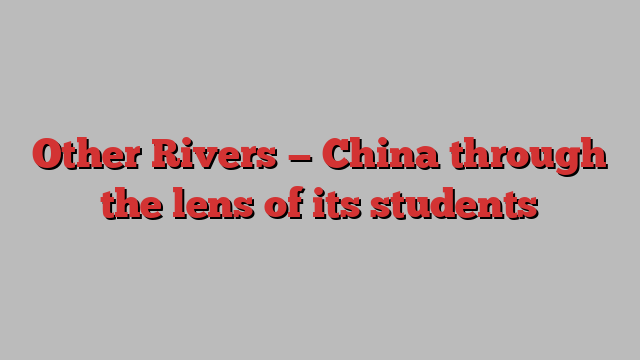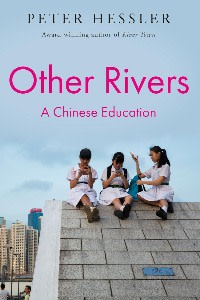
Unlock the Editor’s Digest for free
Roula Khalaf, Editor of the FT, selects her favourite stories in this weekly newsletter.
“Although I am a student of literature,” writes one of Peter Hessler’s students in Sichuan, “I don’t know how to express facts in words now.”
It is one of many memorable lines in Other Rivers, the fourth book on China from an author and journalist who has long been one of its most astute and sensitive foreign observers.
Hessler’s 2019 appointment to teach non-fiction writing at the Sichuan University-Pittsburgh Institute in Chengdu, a quarter of a century after he taught in the same province for the US Peace Corps, is one of several windows into the country’s education system and its current and former students.
Over more than 400 pages, what emerges is a portrait of a country contoured but not defined by politics and economics. Instead, at a time of rising tensions with the US, the book seeks to use education to build a more subtle understanding of a changing China — one that leans more towards impression than cold, hard fact.

Personally invested in the process, Hessler’s case studies of students include his own twin daughters (he is married to author Leslie T Chang), who are enrolled at Chengdu Experimental Primary School.
That provides first-hand insights into an educational environment defined by rules and competition, in which students are shaped by the mutual pressures they exert on each other. In mathematics, the students must draw any kind of line — even a minus sign in an equation — with a ruler. His daughters stick to freehand, until they are docked points.
Frantic messages on a parent WeChat group capture a wider anxious enthusiasm. Hessler describes one scene at a parents’ evening. As though back in school themselves, the parents’ eyes keep to the front; they only use their phones “to take pictures of PowerPoint slides”.
“In four semesters,” he observes, “nobody asked a single question.” (In China, the question is often: why is no one asking one?)
The role that parents play now, writes Hessler, “is vastly different from what I remembered in the 1990s”, when he wrote River Town, an account of teaching in China. “They raised us like they raised pigs or chickens,” writes one of his former students with whom he remains in correspondence. “Our kid,” she adds, as though the grammar of English is bending to foreign truths, “is the only hope of us.”
“When everybody is busy trying to catch the fast-moving train,” writes another, Emily, “no one has time to care about somebody who got off.”
In today’s China, the trains run at exceptionally high speeds. Hessler’s daughters prove oblivious to party propaganda, but when it comes to “competitions and titles”, they cannot resist. Everyone bemoans the intensity of the gaokao, a nationwide exam for 18-year-olds. It is “cruel”, writes Sarinstein, a current student at the university. But it is also an “unsatisfying compromise”; there is no fairer choice.
There is a sense of compromise in Hessler’s own experience. His contract is not renewed; he is reported for a comment on national sovereignty in the margins of a student essay; he undergoes the strains of the zero-Covid system. Sometimes his writing pinpoints the political mood, as when he manages to figure out why a particular golf club does not use golf in its Chinese name (the central government does not approve of courses on arable land).
In such conditions, his skill lies as much in his reading as his writing. The book’s finest moments often come from his students. One describes watching a film about the Cultural Revolution with her family while her father, tellingly, goes out to the garden. “Mallards swam slowly across the lake,” another writes, in an extract on “ordinary life”.
In China, there is a sense of unread lines. I lived in a school in Nanjing in 2011-12; the children started class early and finished late. Once, I showed the “Walrus and the Carpenter” clip from the Alice in Wonderland film. The smoke from the walrus’s cigar is “like the smoke of the factories”, one pupil wrote.
Though they are young, Hessler sees his students as “old souls”. Like him, they possess a certain freedom from judgment that is among the many achievements of Other Rivers. They “understood the system’s flaws and also its benefits”. Despite, or perhaps because of, his own understanding, Hessler never enters into that system as fully as might have been thought possible.
What of his own education? His writing is at its most lyrical when, high on a plateau, he looks up at the “dome of a clear blue sky”. But these are not the plateaus of Sichuan. By then, he is back in Colorado, and his daughter, almost unimaginably, is standing on the school’s roof.
Other Rivers: A Chinese Education by Peter Hessler Atlantic Books £25/Penguin Press $32, 464 pages
Thomas Hale is the FT’s Shanghai correspondent
Join our online book group on Facebook at FT Books Café and subscribe to our podcast Life & Art wherever you listen